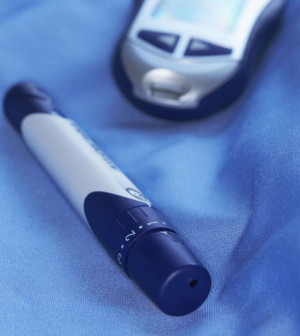- Double Mastectomy May Offer No Survival Benefit to Women With Breast Cancer
- Toxic Lead Found in Cinnamon Product, FDA Says
- Certain Abbott Blood Sugar Monitors May Give Incorrect Readings
- Athletes Can Expect High Ozone, Pollen Counts for Paris Olympics
- Fake Oxycontin Pills Widespread and Potentially Deadly: Report
- Shingles Vaccine Could Lower Dementia Risk
- Your Odds for Accidental Gun Death Rise Greatly in Certain States
- Kids From Poorer Families Less Likely to Survive Cancer
- Tough Workouts Won’t Trigger Cardiac Arrest in Folks With Long QT Syndrome
- At-Home Colon Cancer Test Can Save Lives
Many at Risk for Diabetes and Don’t Know It, Study Finds


New research shows that many Americans who are at risk for type 2 diabetes don’t believe they are, and their doctors may not be giving them a clear message about their risk.
American Diabetes Association researchers surveyed more than 1,400 people aged 40 and older and more than 600 health care providers to come to this conclusion. The investigators found that 40 percent of at-risk people thought they had no risk for diabetes or prediabetes, and only 30 percent of patients with modifiable risk factors for diabetes believed they had some increased risk for diabetes.
Less than half of at-risk patients said they’d had regular discussions with their health care provider about blood pressure, blood sugar levels and cholesterol, and didn’t recall being tested as often as health care providers reported actually testing them.
Only 25 percent of at-risk patients are very or extremely knowledgeable about their increased risk for type 2 diabetes or heart disease, according to health care providers.
While patients do know what helps lower diabetes and heart disease risk, such as a healthier diet and more exercise, many of those who are at-risk are overweight or obese (about 70 percent) and/or sedentary (37 percent).
Health care providers said the greatest barrier to treating at-risk patients is non-compliance with recommended lifestyle changes. This could be because nearly 80 percent of at-risk patients think they are in excellent or good health.
It is critical for health care providers to ensure that patients understand the link between risk factors and diabetes development, said Virginia Peragallo-Dittko, the incoming chair of the American Diabetes Association’s prevention committee and executive director of the Diabetes and Obesity Institute at Winthrop-University Hospital in Mineola, N.Y.
While health care providers think their at-risk patients are making the connection, a quarter of these patients said they weren’t concerned because they don’t have any health problems, she noted in a news release from the American Diabetes Association.
More information
The U.S. Office of Disease Prevention and Health Promotion explains how to prevent type 2 diabetes.
Source: HealthDay
Copyright © 2024 HealthDay. All rights reserved.










